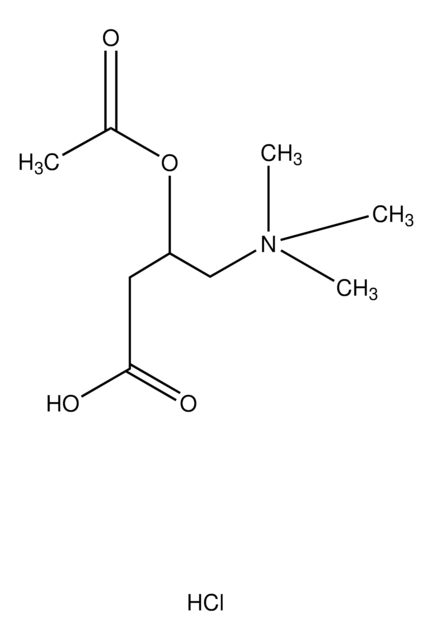C9500
(±)-Carnitine hydrochloride
≥98% (TLC)
Synonym(s):
β-Hydroxy-γ-(trimethylammonio)butyrate hydrochloride, (±)-Carnitine chloride, DL-Carnitine hydrochloride
Sign Into View Organizational & Contract Pricing
All Photos(1)
About This Item
Linear Formula:
(CH3)3N(Cl)CH2CH(OH)CH2COOH
CAS Number:
Molecular Weight:
197.66
Beilstein:
4163212
EC Number:
MDL number:
UNSPSC Code:
12352107
PubChem Substance ID:
NACRES:
NA.26
Recommended Products
Product Name
(±)-Carnitine hydrochloride, ≥98% (TLC)
Quality Level
Assay
≥98% (TLC)
form
powder
color
white
SMILES string
[Cl-].C[N+](C)(C)CC(O)CC(O)=O
InChI
1S/C7H15NO3.ClH/c1-8(2,3)5-6(9)4-7(10)11;/h6,9H,4-5H2,1-3H3;1H
InChI key
JXXCENBLGFBQJM-UHFFFAOYSA-N
Looking for similar products? Visit Product Comparison Guide
Application
DL-Carnitine is a racemic mixture of the quaternary ammonium stereoisomers biologically active L-carnitine and biologically inactive D-carnitine. DL-Carnitine is used in comparative studies with the pure isomers.
Storage Class Code
11 - Combustible Solids
WGK
WGK 3
Flash Point(F)
Not applicable
Flash Point(C)
Not applicable
Personal Protective Equipment
dust mask type N95 (US), Eyeshields, Gloves
Choose from one of the most recent versions:
Already Own This Product?
Find documentation for the products that you have recently purchased in the Document Library.
Customers Also Viewed
A A Spasov et al.
Vestnik Rossiiskoi akademii meditsinskikh nauk, 7(7), 20-27 (2006-08-24)
L-carnitine (L-beta-hydroxy-gamma-N,N,N-trimethylaminobutyric acid) is conditionally necessary for mitochondrial transport and metabolism of long-chain fatty acids, and thus for myocardial energetic metabolism. D-carnitine is not biologically active and might interfere with proper utilization of the L isomer, and so there are
A A Spasov et al.
Bulletin of experimental biology and medicine, 142(4), 458-460 (2007-04-07)
Serum concentration of L-carnitine, the mean thickness of the skeletal muscle fiber, and exercise performance in the forced swimming test decreased in rats receiving a carnitine-deficient diet. Treatment with L-carnitine compensated for carnitine deficiency, while racemate and D-stereoisomer did not
A A Spasov et al.
Rossiiskii fiziologicheskii zhurnal imeni I.M. Sechenova, 91(12), 1469-1480 (2006-02-24)
L-Carnitine (L-beta-hydroxy-gamma-N,N,N-trimethylaminobutyric acid) plays an essential role in fatty acid transport in the mitochondrion. Conditions that appear to benefit from exogenous supplementation of L-carnitine include anorexia, chronic fatigue, cardiovascular disease, hypoglycemia, male infertility, muscular myopathies, renal failure and dialysis. D-Carnitine
Sophie Schobesberger et al.
eLife, 9 (2020-04-02)
Cardiomyocyte β3-adrenoceptors (β3-ARs) coupled to soluble guanylyl cyclase (sGC)-dependent production of the second messenger 3',5'-cyclic guanosine monophosphate (cGMP) have been shown to protect from heart failure. However, the exact localization of these receptors to fine membrane structures and subcellular compartmentation
Yan Wu et al.
Apoptosis : an international journal on programmed cell death, 20(8), 1099-1108 (2015-05-23)
AML (acute myeloid leukemia) cells have a unique reliance on mitochondrial metabolism and fatty acid oxidation (FAO). Thus, blocking FAO is a potential therapeutic strategy to target these malignant cells. In the current study, we assessed plasma membrane carnitine transporters
Our team of scientists has experience in all areas of research including Life Science, Material Science, Chemical Synthesis, Chromatography, Analytical and many others.
Contact Technical Service









